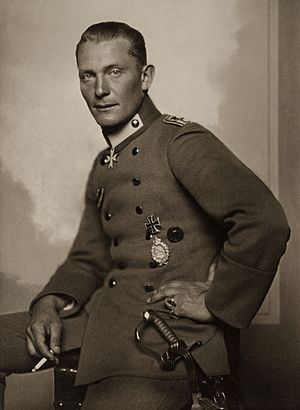Desmond Uniacke facts for kids
Quick facts for kids
Desmond Percival Fitzgerald Uniacke
|
|
|---|---|
| Born | 18 December 1895 Chelsea, Middlesex, England |
| Died | 25 March 1933 (aged 37) Middlesex, England |
| Allegiance | United Kingdom |
| Service/ |
British Army Royal Air Force |
| Years of service | 1914–1919 |
| Rank | Lieutenant |
| Unit | Royal Inniskilling Fusiliers Royal Irish Rifles No. 48 Squadron RFC |
| Battles/wars | World War I • Western Front |
| Other work | Wine salesman |
Lieutenant Desmond Percival Fitzgerald Uniacke (born December 18, 1895 – died March 25, 1933) was a brave British pilot during World War I. He was known as a "flying ace" because he won thirteen air battles. He was even captured after a fight with Hermann Göring, a famous German pilot.
Contents
Desmond Uniacke's Early Life
Desmond Percival Fitzgerald Uniacke was born on December 18, 1895, in Chelsea, England. He was one of five children, but only three lived to be adults. Desmond went to Saint John's College in England. His father, Richard Uniacke, worked as a librarian and historian.
Joining the Military
Desmond Uniacke started his military career on December 23, 1914. He first served in the Royal Inniskilling Fusiliers and the Royal Irish Rifles. Later, he joined the Royal Flying Corps. This was the air force of Britain before it became the Royal Air Force. He became a flying officer on August 15, 1917.
Flying with No. 48 Squadron
Desmond was sent to No. 48 Squadron. Here, he became famous for his thirteen air victories. All of his victories happened while he was an observer in a Bristol F.2b plane. This plane was also called a Bristol Fighter. He achieved all his victories with the same pilot, Second Lieutenant Ralph Luxmore Curtis.

Desmond's Air Victories
Desmond scored his first air victory on July 3, 1917. He and Curtis flew their Bristol F2.b plane and forced a German two-seater plane out of control over Quéant, France. Two days later, they forced an Albatros D.V plane out of control over Bapaume, France.
On July 7, 1917, Desmond and Curtis destroyed another Albatros D.V plane over Vitry, France. Later that month, on July 28, they forced an Albatros D.III plane out of control.
More Victories in August
On August 16, 1917, Desmond and Curtis had a double victory. They were fighting two Albatros D.V planes. One was destroyed in flames, and the other was forced out of control. These battles happened over St. Pierre and Capelle, France.
Desmond's next four victories happened in a different Bristol F.2b plane. On August 20, 1917, he and Curtis forced an Albatros D.V out of control. Just two days later, they had another double victory. They destroyed one Albatros D.V and forced another out of control over Ostend, Belgium.
Final Victories and Capture
Desmond's tenth victory was on September 2, 1917. He and Curtis forced an Albatros D.V out of control east of Diksmuide, Belgium. This victory was shared with another British plane crew.
On September 5, 1917, Desmond and Curtis forced a DFW C plane out of control over Middelkerke, Belgium. Desmond's twelfth victory was on September 14, 1917. He and Curtis destroyed an Albatros D.V over Ghistelles. His last victory happened on September 17, 1917. They forced a German two-seater plane out of control over Leke, Belgium. This victory was also shared with another British plane.
On September 21, 1917, Desmond Uniacke and Ralph Curtis faced Hermann Göring in an air battle. Göring was the leader of a German flying group called Jasta 27. Their Bristol F.2b plane was shot down by Göring. Ralph Curtis sadly died later that day from his injuries. Desmond Uniacke was captured and became a prisoner of war. He was sent back home in January 1919. He left the military on May 12, 1919.
Life After the War
After the war, Desmond Uniacke married Beatrice Mary Swetenham Johnstone in 1920. They lived in London, England. Desmond worked as a wine salesman. He passed away on March 25, 1933, in England.
Gallery of Aeroplanes
 | John T. Biggers |
 | Thomas Blackshear |
 | Mark Bradford |
 | Beverly Buchanan |




